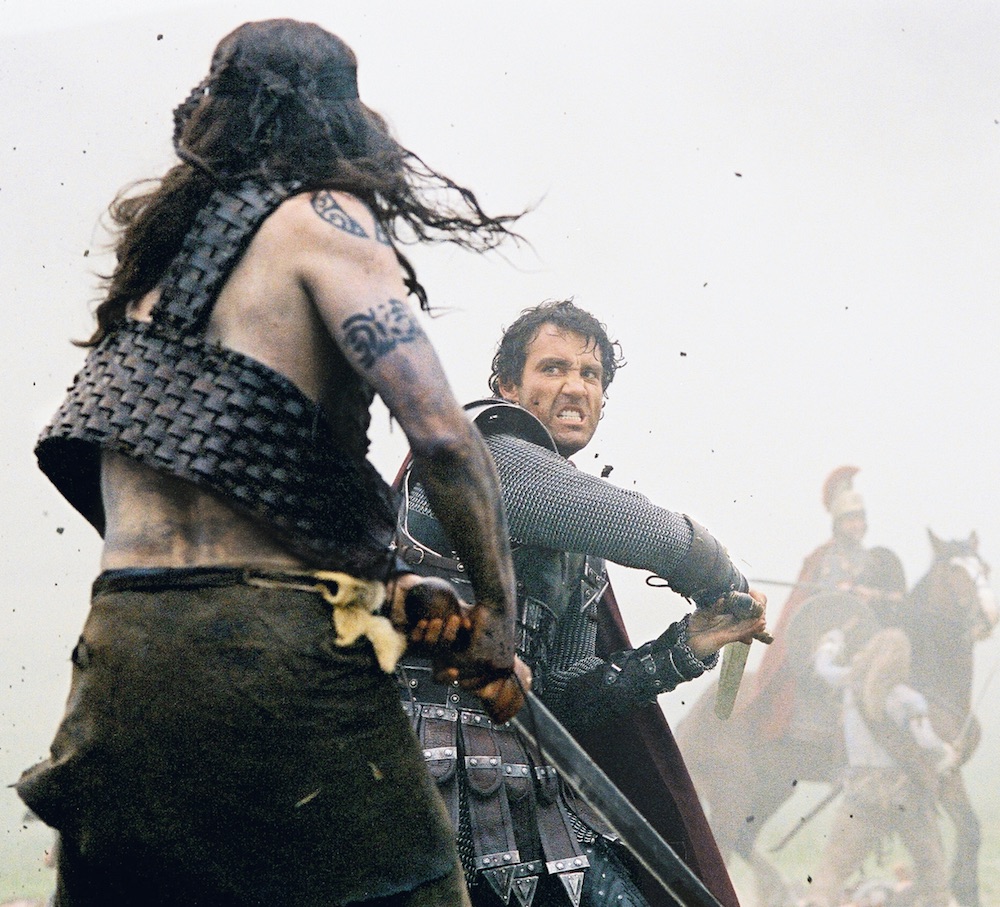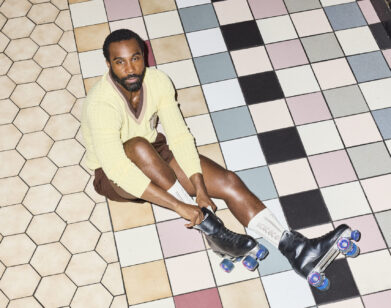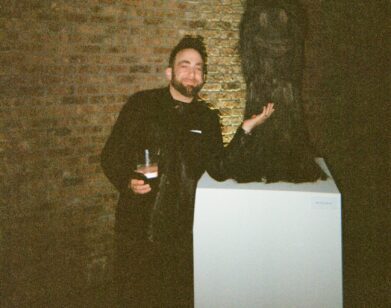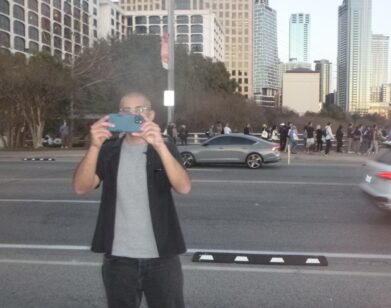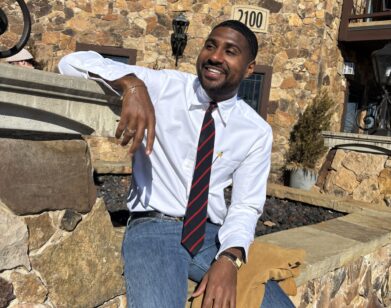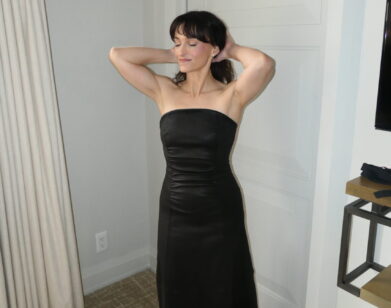Clive Owen
that’s the best place to be, both excited and scared . . . What’s the worst thing that can happen? The worst thing that can happen is that I’ll be bad. I’ve been bad before—I’ll be bad again CLIVE OWEN
There are moments in Clive Owen’s performances—many, many moments—when his eyes seem to go white hot, when he looks to be possessed, by a demon, a drug, or the religious fervor of a maniac. This possessor is very often so powerful it threatens to propel him toward its end no matter the evident destruction being done to his body—the rumpled suit of flesh of which might, at any moment, sag off him entirely. Not that that would stop those eyes from getting to where they are going.
As he tells his friend, fellow actor and musical legend RZA, Owen likes to walk a knife’s edge with his characters. And it can be terrifying to see him do it, from his haunting breakout role in Mike Hodges’s great Croupier (1998), in which Owen plays a sociopathic card sharp with seething charm, to Mike Nichols’s Closer (2004), in which Owen embodies sexual obsession unto the point, nearly, of self-immolation. Owen’s globe-trotting Interpol agent Louis Salinger in Tom Twyker’s The International (2009) is probably the world’s worst co-worker and maybe its greatest villain hunter. Like so many of Owen’s greatest creations, Salinger is a man who torches his life and well-being on the pyre of his crusade. And nothing will stop that crusade. Even Owen’s sad sack Theo, a scarred former revolutionary in Alfonso Cuarón’s adaptation of the apocalyptic P.D. James novel Children of Men (2006), manages to muster a powerful, messianic purpose.
But Owen’s Dr. John Thackery, an obsessive surgeon in turn-of-the-century New York, in Cinemax’s The Knick, is peak possession—a semi-functioning addict driven to Icarus heights by cocaine, ambition, and garden—variety narcissism. On the gladiatorial stage of the Knickerbocker Hospital’s auditorium-style operation room, spattered by blood and viscera, his smock and eyes a blazing white in director Steven Soderbergh’s light, Owen’s Thackery is like something out of Goya—his hound-dog face falling to bits with fatigue, and those eyes are a marvel of passion, paranoia, discovery, delirium, regret, and maybe just plain old madness.
And The Knick, which returned for its second season in October, along with Owen’s return to the stage after 14 years, in Harold Pinter’s Old Times on Broadway this fall, seems to fulfill the promise made all those years ago by Croupier: Owen, at 51, is now, as he was then, one of the most intensely watchable actors on screen and stage. As he tells RZA, that’s all he’s ever really wanted. That, and maybe a Scotch.
RZA: Peace. Good morning, Clive.
CLIVE OWEN: How are you?
RZA: I’m great. I’ve been editing my new film [Coco]. I’m going to show it to the studio on Friday. So it’s a big day for me.
OWEN: And how is it? Are you happy?
RZA: I feel really good about it. And that kid who you met [Lucien Laviscount, who plays Derek] is on fire, man. He did a great job. I think I got something pretty unique and reflective of my brain, you know? How’s the family?
OWEN: Very good. They’ve been coming and going. I’ve been in a tunnel a bit in this play, my first play in 14 years. We did our first preview on Thursday. We have a couple of weeks of previews before the critics come in.
RZA: Fourteen years. Why was it such a long hiatus?
OWEN: I mean, when I started, my first love was the theater. I did a school play when I was a kid and I fell in love with acting. It wasn’t about TV. It wasn’t about movies. I joined a little youth theater in my hometown, and that’s where the whole thing began, really. So it was always something that I was very passionate about. But for a long time now I’ve been getting these great opportunities in film, and more recently in television, with Soderbergh, but I’d been thinking about doing a play. It just had to be the right thing. It had to be something that would carry me through it. And a few things have come in the last year or two. I had sort of flirted with them, and then this one arrived. I love the play, I love the part, and I felt it was the time to do it. Still, it took me two months to say yes. I was so unsure about whether I wanted to cross the line, because once you cross the line and say yes, there’s no going back. In the end, that’s the best place to be, both excited and scared, and I thought I should just go for it. What’s the worst thing that can happen? The worst thing that can happen is that I’ll be bad. I’ve been bad before—I’ll be bad again. [both laugh]
RZA: What would you say is one of the major differences between stage acting and film acting?
OWEN: When I was younger, people used to say you only really prove yourself as an actor on stage. And I disagree with that. Some of the finest acting I’ve ever come across has been for film. Film is very much about capturing the essence of things—if you feel it, and you’ve got the right person shooting it, it’ll come across. Theater’s a different animal; it’s physically different and requires a different discipline. In the theater, you’re mining the same material, constantly honing the same thing, executing it and keeping it alive and fresh.
RZA: I see. So it’s not captured and put in a bag. The bag remains open.
OWEN: Exactly. Like, tonight it’s new again. Just because some bit worked well the other night doesn’t necessarily mean it’s a constant. You’ve got to do it again tomorrow, and tomorrow’s going to be different. Especially with a play like this.
RZA: I can relate to that as a performer. As a musician, some songs work in some cities and some songs don’t work in some cities. You’ve got to feel your audience.
OWEN: Also, there’s the difference between going in and putting down an album and going out there and touring. The theater’s a live thing, and film is, to some extent, a discipline where you’re putting everything together and trying to execute something exactly. You do it away from people and then you present it at the end.
RZA: I would say The Knick—which I love—is a show where, through the eyes of the medical profession, we see a unique view of New York history. How do you feel being those eyes, Dr. John Thackery? Are you learning things about our city that were previously unknown to you?
OWEN: Well, the thing I loved about the whole vibe of The Knick is that it presented period drama in a way that I hadn’t seen before. I mean, I’m English and I’m used to coming from a world of period dramas, where there’s a very polite restraint to everything. Everybody’s sort of sitting in drawing rooms. And the thing about The Knick is it’s really about what it was to be alive then. It was a dangerous, scary place. And for the majority of people, it was not sitting around in drawing rooms; it was a very low-life-expectancy, dangerous, dark world out there, and it was something that I’ve never really seen before in a period drama. And then this character—who is possibly the most complex, unusual lead character I’ve ever read—he was kind of out-there, doing appalling things sometimes, but kind of brilliant and kind of wild.
I like the high-wire act, playing someone who is not entirely straightforward, not something easy, palatable. CLIVE OWEN
RZA: I first discovered your talent as an actor in the film I’ll Sleep When I’m Dead [2003]. You played a character who was removed from city life but had to return to the London underworld to avenge his brother’s death. You went from, like, a calm woodsman to a badass gangster. What did you do to prepare for that role?
OWEN: That film was directed by Mike Hodges—he did Croupier, and the original Get Carter [1971] with Michael Caine, who’s a very good friend. He has a very lean style of filmmaking, very economical. He doesn’t overdo things. And that film was very pared-down. Again, it’s like Thackery, and like a lot of parts I’ve played, like this part in the play that I’m doing now, I like the high-wire act, playing someone who is not entirely straightforward, not something easy, palatable. You look at a film like that and you look at Thackery in The Knick, you’ve got to take people on that journey, and it’s not an easy one. It’s abrasive and strange and difficult—like life is, like people can be. And I love the challenge of that. I love playing someone, and telling a story, that is full of conflict.
RZA: Well, now, I got some female friends who loved your performance in the film Closer. I know you won the Golden Globe for that, and that performance kind of rockets you to one of Hollywood’s “most sexy men.” All the girls want to drop their panties. So what has changed in your professional and your personal life after the success of that film?
OWEN: Well, again, I was hugely blessed with that one, because I did the original play in London, playing the other part. I’ve always loved the play, and so I felt it was a real gift to get that part with that cast, directed by Mike Nichols. I had a great time doing it, and there’s no question that it kind of opened things up for me. [RZA laughs] But I take all of it with a pinch of salt. The frills around the edges don’t get you work with people you want to work with, fulfilling work. I’ve always been in it for the long haul, and the reality is the work is what counts. The rest is what it is.
RZA: As a growing actor myself, I’m impressed with the range that you display in your multifaceted roles. I mean, you went from a wimpy nerd in Derailed [2005] to a gun-toting hero in Sin City [2005] and Shooter [2007], an intriguing spy in The International, and even a menacing villain in Killer Elite [2011]. What advice would you give an aspiring actor in regard to the roles and the range that he must bring to the screen?
OWEN: I think it depends what kind of actor you are. There are some actors who want to hone one thing. They want to do that and they do it very well. When I started in the theater, the joy for me was playing different parts, and I get set alight by different people and different worlds. The biggest joy for me is jumping around and going from that to this to that, never feeling that I’m any one thing—because I’m not, and we as people aren’t. At this point in my career, I’m just constantly trying to renew and give myself new challenges and push myself to uncomfortable places, trying to get better.
RZA: I like the idea of renewing yourself. I’m going to put that in my repertoire. [both laugh]
OWEN: Well, don’t undersell yourself as an actor. You’re a really fucking good actor, mate.
RZA: I’m studying. But look, you’ve worked with some great directors, from Alfonso Cuarón, in Children of Men, to Spike Lee and Antoine Fuqua, to [Quentin] Tarantino, [Frank] Miller, and [Robert] Rodriguez in Sin City, and, of course, now Soderbergh on the show. Do you have a favorite director?
OWEN: No. I’ve been blessed. I’ve worked with so many great people, and for me, it’s all about doing that. It’s a collaboration: doing a play, doing a movie. And movies are certainly a director’s medium, so getting the opportunity to work with really good directors is everything to me, and they are so different. All those names you’ve just thrown out and all the other ones I’ve worked for, none of them are the same. None of them are even similar.
RZA: Well, I love the way you translate the material in each case. Now, being a native of the U.K. and spending a lot of time working in the U.S., what are some of the pros and the cons of a bicountry lifestyle?
OWEN: America’s been very, very good to me. I’ve been very lucky and worked a lot there, and appreciate and love the work that I’ve done. I go home to London in between jobs, and in London, my life has nothing to do with the business. It’s a family life, hanging with friends. I don’t like being consumed by work all the time. I consume myself so much when I do a part that I like to step away from it, and living in London gives me that opportunity. I know that if I lived in L.A., the business would be around me all the time, and I much prefer to have a time out. So I go home and chill with the family.
RZA: Yeah, I’m living in Hollywood a lot. And I still have my home back in New York, but I always find time to at least give myself three months of leaving the business. I live in the woods and I just try to recharge my battery. I think it’s psychologically healthy, that break—there’s a lot of health benefits to that, you know? Now, I really liked this episode of The Knick where Thackery learns to ride a bike, and you had this excited, boyish face. [Owen laughs] It was far away from his intense seriousness. Are you a bike rider?
OWEN: I am, and I was trying to look like I couldn’t ride a bike … It’s interesting you picked that scene out, because there were a few people, Steven included, who thought that it was an important scene because of that—because he’s such a complex, murky character, and then there was this boyish quality.
RZA: It was really cool. I love Butch Cassidy and the Sundance Kid [1969], and I love the bike-riding scene in that, but you topped that scene for me. [Owen laughs] Can you give us fans any secrets about this coming season?
OWEN: The great thing is that Steven Soderbergh came back to direct all ten episodes, which meant that we just hit the ground running. There was no time being spent setting anything up. We had already developed these characters, this world. And I think the big thing about season two is it’s much more expansive. We go out of the hospital more. We see lives outside, we see much more of what’s happening in New York away from the hospital. The beauty of television at the moment, and the beauty of doing something like this with someone like Soderbergh, is that you can really go for it. There is no censor. There is nothing you’re trying to package that you’ve then got to sell in a marketplace, as with a film. You gather viewers and you gather support, and you go, “Okay, we’ve done that. Now it’s important to follow this through.” Steven has done that wholeheartedly. And there’s no question that having him at the helm is a huge deal. He’s got great taste and he’s fearless as a director. His work is bold and intelligent—he doesn’t pander. I loved being around that.
RZA: I know you’ve got to get back to your world. I’m just going to ask you two personal questions real quick: What is your favorite Scotch?
OWEN: That’s a good question. Probably one of those Isle of Skye ones.
RZA: What brings you the most joy in life?
OWEN: Seeing my kids happy.
RZA: I’m with you on that. I knew the answer; I just wanted to hear it out loud. [Owen laughs] And let the world know that we do what we do for that reason.
RZA IS A FOUNDING MEMBER OF THE WU-TANG CLAN. HE IS ALSO THE DIRECTOR OF THE MAN WITH THE IRON FISTS AND IS WORKING ON HIS SECOND FILM, COCO.

